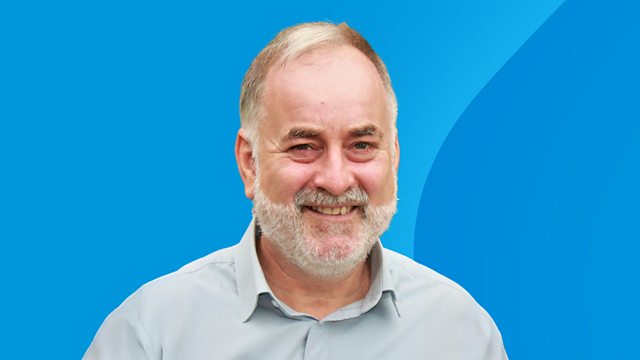Main content
An Litir Bheag 872
Litir Bheag na seachdain sa le Ruairidh MacIlleathain. Litir à ireamh 872. Roddy Maclean is back with this week's short letter for Gà idhlig learners.
Last on
Wed 2 Feb 2022
22:55
Â鶹ԼÅÄ Radio nan Gà idheal
More episodes
Previous
Next
![]()
Corresponding Litir
Litir do Luchd-ionnsachaidh 1176
Clip
-
![]()
An Litir Bheag 872
Duration: 03:33
An Litir Bheag 872
Tha sinn a’ toirt sùil air na notaichean Gà idhlig ann an Leabhar Dhèir. Ghabh mac aig Bede galar. B’ e Bede an ceannard Cruithneach ionadail. Dhiùlt e à ite airson manachainn a thoirt do Chalum Cille.Ìý
Seo na thachair an uair sin: … chaidh am morair a dh’athchuinge nan clèireach gun dèanadh iad ùrnaigh [airson slà inte a’ ghille]... Dh’aontaich Bede fearann a thoirt do Chalum Cille nan tigeadh slà inte don ghille.
Rinn na clèirich ùrnaigh. Thà inig slà inte don ghille. Fhuair Calum Cille am fearann. Ach thug e seachad e do a chompanach, Drostan. Seo na tha ann an Leabhar Dhèir: … thug Calum Cille do Dhrostan a’ chathair sin, agus bheannaich e i, agus dh’fhà g e am briathar – ge b’ e a sheasadh na h-aghaidh, nach biodh e bliadhnach, buadhach.
Dh’fhà g Calum Cille mallachd air duine sam bith a sheasadh an aghaidh na manachainn – nach biodh e bliadhnach, buadhach. Tha sin a’ ciallachadh nach biodh a bheatha fada no soirbheachail.Ìý
Nise, a bheil sibh eòlach air ¶Ùè¾±°ù ann an Siorrachd Obar Dheathain? Chan eil sgeul air a’ mhanachainn an-diugh. Ach thathar a’ smaoineachadh gun robh i an ìre mhath far a bheil Old Deer.Ìý
Ach dè tha an t-ainm Deer – no ¶Ùè¾±°ù – a’ ciallachadh? Tha seantans anns na notaichean ag innse sin dhuinn:
Seo na ciad trì faclan anns an t-seantans: Tángator »åé²¹°ù²¹ Drostán. Ann an Gà idhlig an latha an-diugh: Thà inig »å±ðò¾±°ù Dhrostain. Drostan’s tears came. Anns an dà rna linn deug, chanadh na Gà idheil »åé²¹°ù²¹ far am bi sinne ag rà dh an-diugh »å±ðò¾±°ù. Tears.Ìý
Seo an seantans gu lèir: Thà inig »å±ðò¾±°ù Dhrostain air sgaradh ri Calum Cille. Labhair Calum Cille, ‘biodh ¶Ùè¾±°ù ainm bho seo a-mach.’
Mar sin, thà inig an t-ainm-à ite ¶Ùè¾±°ù – no Deer – a rèir Leabhar Dhèir bho na »å±ðò¾±°ù a leig Drostan nuair a dh’fhalbh Calum Cille.Ìý
Cò bha ann an Drostan, co-dhiù? Gu fortanach, tha cunntas air ann an Leabhar Ùrnaighean Obar Dheathain no Breviarium Aberdonense. Tha e ag innse dhuinn gun robh Drostan na aba agus gun robh a latha fèille air a’ cheathramh latha deug dhen Dùbhlachd. Tuilleadh mu dheidhinn anns an ath Litir.
Seo na thachair an uair sin: … chaidh am morair a dh’athchuinge nan clèireach gun dèanadh iad ùrnaigh [airson slà inte a’ ghille]... Dh’aontaich Bede fearann a thoirt do Chalum Cille nan tigeadh slà inte don ghille.
Rinn na clèirich ùrnaigh. Thà inig slà inte don ghille. Fhuair Calum Cille am fearann. Ach thug e seachad e do a chompanach, Drostan. Seo na tha ann an Leabhar Dhèir: … thug Calum Cille do Dhrostan a’ chathair sin, agus bheannaich e i, agus dh’fhà g e am briathar – ge b’ e a sheasadh na h-aghaidh, nach biodh e bliadhnach, buadhach.
Dh’fhà g Calum Cille mallachd air duine sam bith a sheasadh an aghaidh na manachainn – nach biodh e bliadhnach, buadhach. Tha sin a’ ciallachadh nach biodh a bheatha fada no soirbheachail.Ìý
Nise, a bheil sibh eòlach air ¶Ùè¾±°ù ann an Siorrachd Obar Dheathain? Chan eil sgeul air a’ mhanachainn an-diugh. Ach thathar a’ smaoineachadh gun robh i an ìre mhath far a bheil Old Deer.Ìý
Ach dè tha an t-ainm Deer – no ¶Ùè¾±°ù – a’ ciallachadh? Tha seantans anns na notaichean ag innse sin dhuinn:
Seo na ciad trì faclan anns an t-seantans: Tángator »åé²¹°ù²¹ Drostán. Ann an Gà idhlig an latha an-diugh: Thà inig »å±ðò¾±°ù Dhrostain. Drostan’s tears came. Anns an dà rna linn deug, chanadh na Gà idheil »åé²¹°ù²¹ far am bi sinne ag rà dh an-diugh »å±ðò¾±°ù. Tears.Ìý
Seo an seantans gu lèir: Thà inig »å±ðò¾±°ù Dhrostain air sgaradh ri Calum Cille. Labhair Calum Cille, ‘biodh ¶Ùè¾±°ù ainm bho seo a-mach.’
Mar sin, thà inig an t-ainm-à ite ¶Ùè¾±°ù – no Deer – a rèir Leabhar Dhèir bho na »å±ðò¾±°ù a leig Drostan nuair a dh’fhalbh Calum Cille.Ìý
Cò bha ann an Drostan, co-dhiù? Gu fortanach, tha cunntas air ann an Leabhar Ùrnaighean Obar Dheathain no Breviarium Aberdonense. Tha e ag innse dhuinn gun robh Drostan na aba agus gun robh a latha fèille air a’ cheathramh latha deug dhen Dùbhlachd. Tuilleadh mu dheidhinn anns an ath Litir.
The Little Letter 872
We are looking at the Gaelic notes in the Book of Deer. A son of Bede caught a disease. Bede was the local Pictish leader. He refused to give Columba a place for a monastery.
Here’s what happened then: … the mormaer went to beseech the clerics that they would make a prayer [for the boy’s health]… Bede agreed to give land to Columba if the boy’s health returned.
The clerics made a prayer. The boy became healthy. Columba got the land. But he gave it to his companion, Drostan. Here’s what is in the Book of Deer:... Columba gave Drostan that place, and he blessed it, and left the statement – whoever would stand against it, he would not be long-lived or successful.
Columba cursed anybody that would stand against the monastery – that he would not be long-lived or successful. That means that his life would not be long or full of success.
Now, do you know Deer in Aberdeenshire? There is no sign of the monastery today. But it is thought that it was pretty much where Old Deer is situated.
But what does the name Deer – or ¶Ùè¾±°ù – mean? A sentence in the notes tells us that:
Here are the first three words in the sentence. Tángator »åé²¹°ù²¹ Drostán. In modern Gaelic: Thà inig »å±ðò¾±°ù Dhrostain. Drostan’s tears came. In the twelfth century, the Gaels would say »åé²¹°ù²¹ where we today say »å±ðò¾±°ù. Tears.
Here is the entire sentence: Drostan’s tears came upon parting from Columba. Columba said, ‘let Deer be its name henceforth.’
Thus the place-name ¶Ùè¾±°ù – or Deer – according to the Book of Deer, came from the tears that Drostan shed when Columba left.
Who was Drostan, anyway? Fortunately, there is an account of him in the Aberdeen Breviary. It tells us that Drostan was an abbot and that his feast-day was on the 14th of December. More about him in the next Litir.Ìý ÌýÌý
Here’s what happened then: … the mormaer went to beseech the clerics that they would make a prayer [for the boy’s health]… Bede agreed to give land to Columba if the boy’s health returned.
The clerics made a prayer. The boy became healthy. Columba got the land. But he gave it to his companion, Drostan. Here’s what is in the Book of Deer:... Columba gave Drostan that place, and he blessed it, and left the statement – whoever would stand against it, he would not be long-lived or successful.
Columba cursed anybody that would stand against the monastery – that he would not be long-lived or successful. That means that his life would not be long or full of success.
Now, do you know Deer in Aberdeenshire? There is no sign of the monastery today. But it is thought that it was pretty much where Old Deer is situated.
But what does the name Deer – or ¶Ùè¾±°ù – mean? A sentence in the notes tells us that:
Here are the first three words in the sentence. Tángator »åé²¹°ù²¹ Drostán. In modern Gaelic: Thà inig »å±ðò¾±°ù Dhrostain. Drostan’s tears came. In the twelfth century, the Gaels would say »åé²¹°ù²¹ where we today say »å±ðò¾±°ù. Tears.
Here is the entire sentence: Drostan’s tears came upon parting from Columba. Columba said, ‘let Deer be its name henceforth.’
Thus the place-name ¶Ùè¾±°ù – or Deer – according to the Book of Deer, came from the tears that Drostan shed when Columba left.
Who was Drostan, anyway? Fortunately, there is an account of him in the Aberdeen Breviary. It tells us that Drostan was an abbot and that his feast-day was on the 14th of December. More about him in the next Litir.Ìý ÌýÌý
Broadcasts
- Sun 30 Jan 2022 14:30Â鶹ԼÅÄ Radio nan Gà idheal
- Wed 2 Feb 2022 22:55Â鶹ԼÅÄ Radio nan Gà idheal
All the letters
Tha gach Litir Bheag an seo / All the Little Letters are here.
Podcast: An Litir Bheag
The Little Letter for Gaelic Learners
An Litir Bheag air LearnGaelic
An Litir Bheag is also on LearnGaelic (with PDFs)
Podcast
-
![]()
An Litir Bheag
Litirichean do luchd-ionnsachaidh ura. Letters in Gaelic for beginners.




